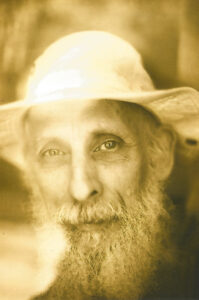Let me tell you about the Good Teacher. He indwells you. He has always indwelt you. He speaks through your conscience, warning you not to do evil. If you remember telling a lie or stealing something when you were a child, you may remember that it gave you a kind of sick feeling. That was His voice rebuking you, or Her voice if it feels more natural to you to think of the Teacher as feminine. The prophet Jeremiah spoke of God’s writing God’s law on people’s hearts (Jer 31:33), so if you think of that Voice being the Divine Law rebuking you, you could say “Its voice.” But don’t deceive yourself about it: you are being watched, and your Watcher invites you to communicate directly with Him, Her, or It, for your Watcher wishes only what is best for you. But to reap the benefits that your Watcher has in store for you, you must say “yes” and welcome your Watcher, the Good Teacher.
In the year 1696, Quaker William Penn published a book called Primitive Christianity Revived. It began:
THAT which the People call’d Quakers lay down, as a Main Fundamental in Religion, is this, That God, through Christ, hath placed a Principle in every Man, to inform him of his Duty, and to enable him to do it; and that those Live up to this Principle, are the People of God, and those that Live in Disobedience to it, are not God’s People, whatever Name they may bear, or Profession they may make of Religion. This is their Ancient, First, and Standing Testimony: With this they began, and this they bore, and do bear to the World.
Penn was introducing that same divine Watcher by calling it “a Principle in every Man [and woman], to inform [them] of [their] Duty, and to enable [them] to do it.” For It is not only a Warner against evil conduct but an Encourager to right conduct. And it is not only an Encourager but also an Enabler of what It encourages. Penn goes on to identify It as “something that is Divine; and though in Man, yet not of Man, but of God; and that it came from Him, and leads to Him all those that will be led by it.”
I’ve been shown that this Teacher, Warner, Encourager or Enabler has the power to speak to me in clear English, to give me courage, patience, and perseverance when my own is lacking, and to lead me, as if miraculously, to people, places, information, and wisdom I had need of, or who had need of me. It has blessed me with the peace of a clean conscience in the sight of God, after years of living with a dirty one laden with sins. And I don’t doubt that this Teacher of Good will do the same for you. He, She or It will tell you what to call Him, Her, or It. As you continue to obey your Good Teacher, you will come to trust that it will always be better for you, and everyone else, to obey your Teacher’s will rather than your own when the two wills disagree. In this way you will grow into a reliable servant of God. There is no higher calling.
But now let me tell you about the Evil Teacher. Again, it doesn’t matter whether you call this being, or voice, or principle, “him,” “her,” or “it” – but I’ll call it “him” here, to remind you that I think he has intelligence, intentionality, and a center or will capable of strategic planning and coordinated action. Wherever we see people reasoning, “Let us do evil, that good may come” (Rom 3:8), we may be sure that he has been at work, persuading men and women that a little selfishness, a little deceit, a little ignoring of the wants and needs of others, is what’s best for themselves, will cost them no future suffering, and in any case will not make the world a significantly worse place. In the biblical story of Adam and Eve he appears as the serpent who persuaded the first humans, to their lasting sorrow, that it would be better for them if they each obeyed their own will and not God’s (Gen 3:1-15). In the next generation, God warns Adam and Eve’s firstborn son against the Evil One, this time calling him “sin” (Gen 4:7). Jesus called him “the devil” and “Satan” (Matt 4:10, 13:39, 25:41, Mark 4:15, Luke 10:18, 22:31, John 8:44). The apostle Paul called him “the god of this world, who has blinded the minds of the unbelievers, to keep them from seeing the light of the gospel” (2 Cor 4:4 NRSV). He seems to have blinded the minds of many believers, too: in the first century, Jesus taught love of the enemy, universal forgiveness, and absolute nonviolence. But by the fourth century, Christianity was weaponized, and the Church leaders mobilized the Emperor’s sword against Christians who disagreed with the doctrines that the leaders laid down. Although the Scriptures showed Jesus telling people, “Go, and sin no more” (John 5:14, 8:11), it became Church doctrine that human beings (Jesus and His mother excepted) could not possibly go and sin no more, so long as their souls were embodied in mortal flesh; they could only have Christ’s righteousness “imputed” to them while they went on with lives mired in sin. The “god of this world,” in my view, had even blinded the minds of the recognized authorities of Christianity.
George Fox, the leading prophet of early Quakerism, gave this bleak diagnosis of the spiritual condition of fallen “Adam and Eve and their disobedient posterity:”
the serpent’s teaching was a lie, who was a liar from the beginning, and a murderer; and [as for] Adam and Eve’s becoming as gods [as the serpent had promised], they were dead to God, according to God’s word; but the serpent he became their god, and Adam and Eve his slaves, and their disobedient posterity, and were plunged and baptized into the serpent’s image, likeness, power and wisdom, by which man knows not God (Fox, “Concerning the Living God of Truth; and the World’s god, in Whom There is No Truth” (1679), in Works, v. 6, p.10).
Yes. Sad to say, if we hope to have Christ dwelling in us and us dwelling in Christ, as Jesus promised His followers (John 6:56), and yet we behave like devils to other human beings on the orders of our government, our employer, our sense of economic necessity, or our own anger, lust, cowardice, or other vices, we remain in the image and likeness of the serpent, and we are acting also in the devil’s power and wisdom, which is untruth. The truth is that the evil we do, we do to ourselves, only our experience of the suffering is delayed. One glimpse of this truth should be enough to set our feet flying to the refuge of our Savior, the Good Teacher, who alone knows how to free us from this bondage. Let us examine our conduct and, if we haven’t yet done so, hurry to our Rescuer.
POSTSCRIPT: William Penn wrote with admirable clarity about that “Principle in every Man, to inform him of his Duty, and to enable him to do it.” Moreover, Penn is one of the few Quaker writers I know who took the trouble to showcase the teaching of Romans 3:8 (“A good End cannot sanctify Evil Means; nor must we ever do Evil, that Good may come of it” – Some Fruits of Solitude, §537). But the truth seems to be that, if the holy Principle in Penn did inform him of a duty to abstain from slaveholding, he disobeyed: see https://billypenn.com/2020/08/17/william-penn-owned-enslaved-people-these-are-some-of-their-names-e/. May God be merciful to the souls of both the enslaved ones and Penn himself.
I have also spoken of George Fox as a “prophet,” which implies, in the minds of most of us, complete faithfulness to the promptings of God. I cannot excuse his toleration of slave-owning by Quakers in Barbados, Jamaica, and North America, but the record does show his consistent concern for the spiritual well-being of all human beings, including enslaved ones. For a nuanced study of the matter, see J. William Frost, “George Fox’s Ambiguous Anti-slavery Legacy” (https://web.tricolib.brynmawr.edu/speccoll/quakersandslavery/commentary/people/fox.php).
There may be social evils that you and I tolerate but our descendants, centuries from now, will find unforgivable. More to the point, we may be held answerable for our part in perpetuating them when we face our own Judgment. May we each pray for more light on our complicities with injustice.

John Jeremiah Edminster (M. Div., Earlham School of Religion, 2019) worships regularly with Conservative Friends and hosts the Tuesday evening House of Light Friends’ Worship Group in his home in Richmond, Indiana. He carries a concern to promote surrender of self to Christ.

What does it mean to be a gathering space for thoughtful and creative reflections on the history, theology, and modern practices of the Church of the Brethren and related movements? Brethren Life & Thought has a long history of working to be such a space. We’re excited to bring our content online through DEVOTION: A Blog by Brethren Life & Thought. Here, you’ll find sermons and other writings from Brethren, Mennonite, and Quaker writers from a variety of theological and social contexts. Some weeks, you might read a piece that resonates with you. Some weeks, you might read a piece that challenges you. Some weeks, you might read a piece you think is heretical. For good or for ill, the Anabaptist and Peace Church movements are remarkably diverse in faith and practice. This blog attempts to expose our readers to the vastness of that diversity – even when it makes us uncomfortable. As you comment, which we highly encourage you to do back on our Facebook page, please remember to do so in light of our membership in the Body of Christ. Let us be different than the world for Jesus truly does invite us to another way of living.

